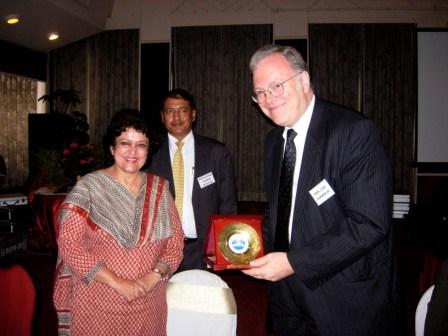Professors Durham and Scharffs Participate in Conference on the Emerging New Constitution in Nepal, 5-7 May 2011

International Center for Law and Religion Studies Director Cole Durham and Associate Director Brett Scharffs participated in a conference in Kathmandu, Nepal on 5-7 May 2011, on The Emerging New Constitution in Nepal. The conference convened in the shadow of a looming deadline of 28 May 2011 for the Constituent Assembly to agree on a new draft constitution. The conference was held to discuss several of the most important unresolved issues, including federalism, judicial independence and accountability, forms of governance, and human rights, including women’s rights and freedom of religion and belief.
The conference capstone was an invitation for the foreign participants to meet with his Excellency, Dr. Ram Baran Yadav, the President of Nepal, to share their perspectives on the key impressions and findings of the Conference. At that meeting President Yadav emphasized the significance of history, geography, and ethnicity to the challenges facing the process of agreeing upon a new constitution.
The conference was sponsored by the G.P.K Centre for Democracy, Peace & Development, Nepal’s foremost law school, Tribhuvan University, and the Nepal Bar Association, and supported by the International Center for Law and Religion Studies. It was a successor to a similar conference held earlier in the Constitution drafting process in February 2009. The conference was opened by Nepal Deputy Prime Minister, Sujata Koirala, and the keynote speaker was the Constituent Assembly Chairperson, Subhash C. Nemwang.
Conference participants included representatives of all of the major political parties of the country, as well as international experts from the U.S., Australia, India, Spain, and South Africa. International delegates in addition to Durham and Scharffs included Georgetown University Law Professor Jane H. Aiken, University of Melbourne Law Professor and Pro-Vice Chancellor Simon Evans, Professor Tahir Mahmood and Nazia Khan from Amity University in India, Professor David Pimental, a Fullbright Scholar at the University of Sarajevo, Professor Jenik Radon from Columbia University, University of Iowa Law School Professor John Reitz, who is currently President of the American Society of Comparative Law, University of Granada Law Professor Augustin Ruiz Robledo, and University of Pretoria and Emory Law School Professor Johan van der Vyver.
Professor Durham participated in the opening ceremonies, where he delivered a speech in which he noted the progress over the past three years since the adoption of the interim constitution in 2007, and emphasized that the foreign participants should be utilized as a resource for comparative law approaches to solving issues that recur in many legal systems. He noted the significance of constitutional moments as key opportunities for creating a framework for charting a country’s future, noting the example of the Czech and Slovak republics. He echoed the hope of others that the constitution-making process in Nepal would result in a more lasting and enduring constitution, and that underlying factors such as civil society and the family would not be ignored. He noted the difficulty of transplanting legal ideas from one system to another, likening them to heart transplants that can trigger severe allergic reactions if they are not done with proper care and sensitivity. Professor Durham emphasized that the foreign participants came not with a particular agenda, and that indeed the foreign participants themselves had a wide variety of views on many of the critical issues. Rather, he said, “the foreign guests come as part of an international process, not a western process, but a common human enterprise of finding ways to live together in a pluralistic world.”
Professor Durham later made a presentation about the correlations between protecting religious freedom and other social goods, drawing upon extensive recent social science findings. He noted that religious freedom and pluralism is often an anecdote to tensions between different religious, ethnic and cultural groups, and the impulse to suppress differences and impose uniformity can have various unintended negative consequences.
Professor Durham also spoke at the concluding session, where he emphasized the things that a constitution is not (a magic wand, a means of removing issues from normal politics, a tabula rosa), and the importance of protecting pluralism. He emphasized the importance of respecting the full range of human rights, including rights to freedom of religion and belief, including the right to have, hold, choose and change religious and non-religious beliefs. People understandably fight back when their rights are limited, and a constitution should create a framework for treating all people fairly, and for making them safe in their differences. He urged those working on the constitution to view the plurality of Nepal’s peoples as a resource, and to avoid approaches that coerce homogeneity.
Professor Scharffs made two presentations, one on the Human Rights Framework for Freedom of Religion and Belief, in which he recounted the story of the drafting and adoption of the Universal Declaration of Human Rights in 1948, and another on Emerging Human Rights Baselines with Respect to Freedom of Religion and Belief. In this presentation, Professor Scharffs emphasized three institutional norms and three individual freedom norms that have become entrenched in human rights practice and human rights-based case law in the past half century. The institutional norms include the right of a religious organization to register and receive legal entity status, the right to autonomy over the governance of its internal affairs, and equal treatment. The individual norms include the right to belief and expression, the right to choose and change religion, including the right not to believe in any religion, and the practice of reasonable accommodations of religious difference.